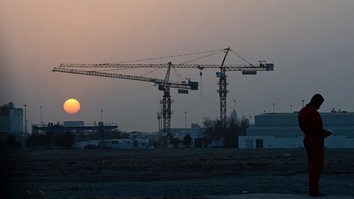ISLAMABAD -- Pakistani religious scholars and politicians are condemning attacks carried out by Yemen's Houthi rebels on Saudi Arabia.
The Iran-backed Houthis, who refer to themselves as Ansarallah, on June 16 claimed responsibility for sending drones to target a military airport in the Saudi border city of Khamis Mushait.
Saudi forces downed two drones, the Arab coalition said June 17.
Since the beginning of the conflict in Yemen, the Houthis have fired dozens of missiles into Saudi Arabia with most intercepted by the Saudi military.
![Punjab Governor Chaudhry Mohammad Sarwar speaks during a conference in June 2019 on Pak-Saudi relations in Lahore as Pakistan Ulema Council chairman Hafiz Muhammad Tahir Mehmood Ashrafi, centre in black turban, looks on. [Zia Ur Rehman]](/cnmi_pf/images/2020/06/24/24679-photo_1_houthis-585_329.jpg)
Punjab Governor Chaudhry Mohammad Sarwar speaks during a conference in June 2019 on Pak-Saudi relations in Lahore as Pakistan Ulema Council chairman Hafiz Muhammad Tahir Mehmood Ashrafi, centre in black turban, looks on. [Zia Ur Rehman]
The Pakistani government strongly condemned the latest attempt by the Houthis to target Saudi civilians.
Pakistan "reaffirms its full support and solidarity with the brotherly Kingdom of Saudi Arabia against any threats to its security and territorial integrity", the Foreign Ministry said in a statement on June 18.
Anger in Pakistan
Pakistani citizens, scholars and politicians criticised the latest attack.
Hafiz Muhammad Tahir Mehmood Ashrafi, chairman of the Pakistan Ulema Council (PUC), an alliance of top Islamic clerics in the country, condemned the June 16 attack on Saudi territory.
The Saudi government has been fighting on multiple fronts to foil the conspiracies of the enemies of Islam and of Muslims, he added.
"Amidst the prevailing situation, when the entire world is struggling to contain the coronavirus pandemic, Houthi militias have been carrying out missile attacks to target civilians and infrastructure in different cities in the Kingdom of Saudi Arabia," said Ashrafi, who is secretary-general of the International Tazeem-e-Haramain Al-Sharifain Council, a global body formed to protect the holy cities of Makkah and Medina in Saudi Arabia.
Earlier on May 22, the PUC organised the "Yaum-e-Azmat-e-Haramain Al-Sharifain" campaign to condemn Houthi attacks on Saudi soil.
"Elements that seek to create anarchy and divisions within Muslims will not succeed in their nefarious designs and conspiracies," said Maulana Abdul Baqi, a central leader of the Jamiat Ulema-e-Islam (Fazl) (JUI-F) party.
"Protecting Saudi Arabia is part of the faith for every Muslim," said Baqi.
His party has condemned Houthi attacks in parliament and asked global Islamic bodies, including the Organisation of Islamic Co-operation, to take action against the Houthis, he said.
Widespread condemnation from Pakistan -- both at the government level and from political and religious parties -- shows that the country has dropped its previous neutrality in the Yemen conflict, said Muhammad Hussain Shah, a professor of international relations in Karachi.
"In the beginning of the Yemen conflict, Pakistan's parliament decided in April 2015 to stay neutral in the crisis, a month after a Saudi-led coalition intervened in the conflict by conducting air strikes against the Houthi militants," Shah said.
Because of Pakistan and Saudi Arabia's brotherly relations, and in particular, Saudi Crown Prince Mohammad bin Salman's two-day visit to Islamabad in February 2019, Pakistan has shifted its stance on the Yemen conflict, he said.
Continuing attacks
Islamabad has regularly condemned Houthi attacks on Saudi territory.
In June 2019, the Foreign Ministry denounced a missile barrage launched by Houthi militants against the Abha airport in Saudi Arabia that wounded 26 civilians.
Pakistan also criticised the May 2019 firing of ballistic missiles by Houthis toward Makkah.
The repeated Houthi bombardments of the kingdom are evidence of the policy of Iran's Islamic Revolutionary Guard Corps (IRGC), which supports, funds and commands the militia, Saudi police officer Maj. Jamal al-Nukhaifi told Al-Mashareq earlier this month.
The Houthis have carried out five similar attacks in the past 50 days, al-Nukhaifi said, including an attempted ballistic missile barrage that Saudi forces thwarted June 13.
The kingdom's missile defence system succeeded in shooting down the latest drones and ballistic missiles, according to the Al-Mashareq report.
The aim of these strikes is to shift attention away from the Iranian regime, which is facing mounting international anger over a new United Nations report confirming that cruise missiles that damaged Saudi oil installations last September were of Iranian origin, said Al-Nukhaifi.
"The anger and condemnation expressed following the attacks reflect the extent of the regional and international rejection of the IRGC and its affiliates," he said.

![A picture taken during a guided tour with the Saudi military on June 13, 2019, shows a worker inspecting the damage at the Abha airport in Saudi Arabia, one day after a Houthi missile attack that wounded 26 civilians. [Fayez Nureldine/AFP]](/cnmi_pf/images/2020/06/24/24695-000_1hh1ti-585_329.jpg)






